The effect of long-term traditional Chinese medicine treatment on disease-free survival of postoperative stage I-III lung cancer patients:a retrospective cohort study
Su-Tong Liu,Su-Fang Zhang,2,Kai-Qi Su,Ying-Bin Luo,Zhi-Hong Fang,Yuan Fang,Jing Xu,Jian-Chun Wu*,Yan Li*
1Department of Oncology,Shanghai Municipal Hospital of Traditional Chinese Medicine,Shanghai University of Traditional Chinese Medicine,Shanghai,China.2Department of Traditional Chinese and Western Medicine,Shanghai Pulmonary Hospital of Tongji University School of Medicine,Shanghai,China.3Shanghai University of Traditional Chinese Medicine,Shanghai,China.
Background
Lung cancer is one of the most common malignancies with morbidity and mortality ranking first in malignant tumors[1].According to the global cancer statistics in 2012,there were 1.92 million newly diagnosed lung cancer patients worldwide with 1.6 million deaths,of which more than 60%were in developing countries[2].In China,there were 733,000 new cases of lung cancer and about 610,000 fatalities in 2015[3].A variety of treatments have been widely used to treat lung cancer,such as surgery, chemotherapy, radiotherapy,immunotherapy and targeted therapy[1,4].Although considerable progress in the early diagnosis and treatment of lung cancer has been made,its recurrence and metastasis rates are still on the rise[5],the 5-year survival rate is still less than 16.6%[6].Under such circumstance, personalized multidisciplinary comprehensivetreatmentshaveemerged and are recommended for the treatment of lung cancer patients[7,8].
Traditional Chinese medicine(TCM)has been widely used as an alternative therapy for several cancers in China because of it has a comprehensive ability in enhancing the effect of treatment,improving the quality of life,and reducing the risk of recurrence and metastasis[9-15].A number of studies have shown that oral Chinese herbal medicine can benefit patients with colorectalcancer[16],gastriccancer[17],non-small cell lung cancer(NSCLC)[18,19],ovarian cancer[20]and liver cancer[21].However,most of current studies are based on short-term efficacy and the impact on quality of life and side effects,it is not been explored as to whether long-term TCM treatment is effective and worth to be recommended to different stages of lung cancer patients[18,22].
Therefore,this study was undertaking to clarify the effect of long-term TCM treatment on disease-free survival(DFS)of different stages lung cancer patients.
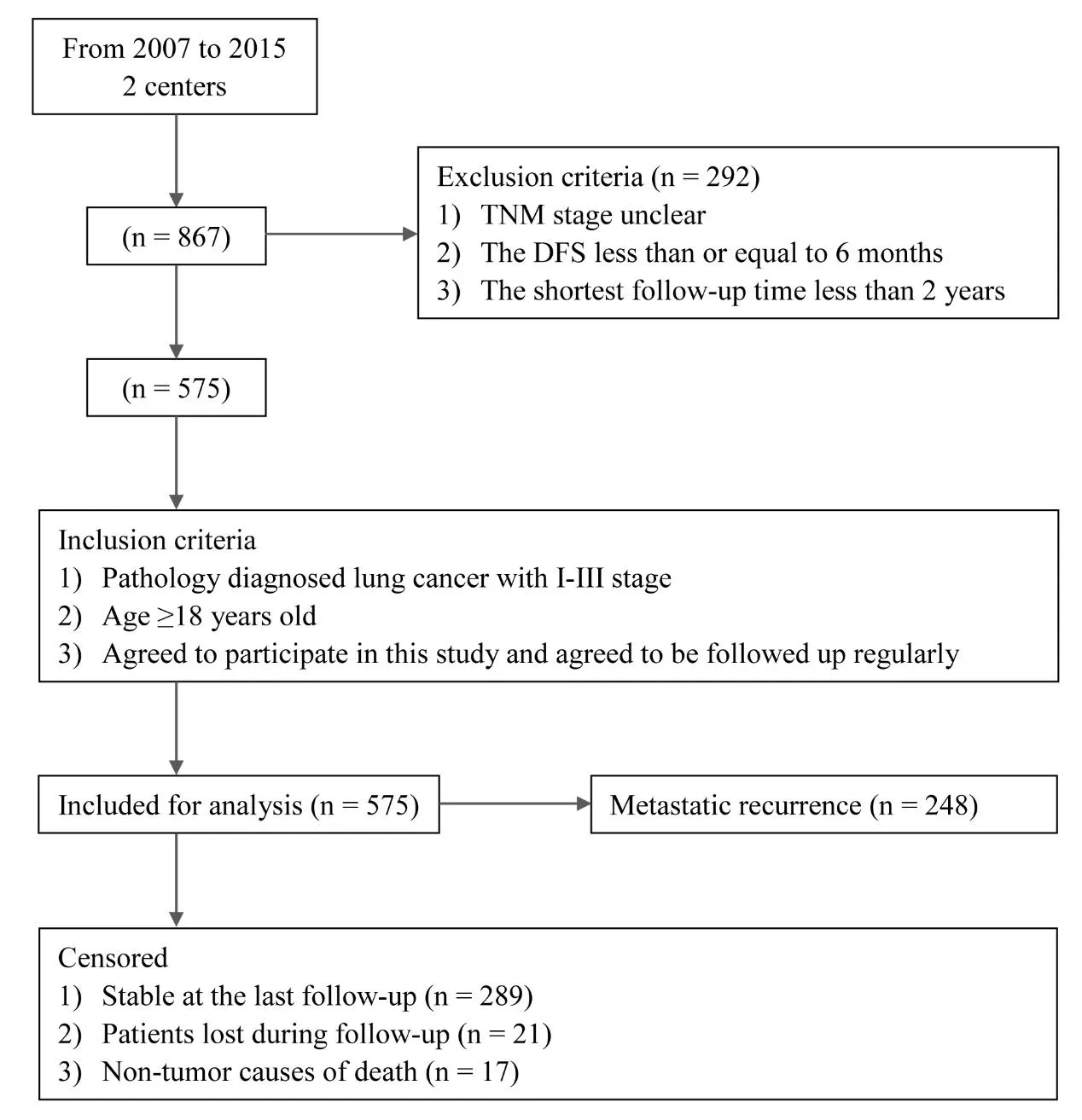
Figure 1 The flow chart of patients selection and censoring for this study
Methods
Study design and participants.
This study was designed as a multicenter,retrospective observational cohort study involving Shanghai Pulmonary Hospital of Tongji University School of Medicine and ShanghaiMunicipalHospitalof Traditional Chinese Medicine,and the study protocol was approved by the Ethics Committee of Shanghai Municipal Hospital of Traditional Chinese Medicine.867 lung cancer patients between January 2007 and September 2015 were screened and 575 were included in this study.Among them,299 patients who were treated with TCM systematically after radical surgery were divided into TCM group and 276 who were not treated with TCM after radical surgery were into the control group(Figure 1).
Systematic TCM treatment.
Systematic TCM treatment was defined as that patients regularly taking traditional Chinese herbal decoction,while the process was recommended to take at least six months continuously.Two weeks were defined as one cycle of treatment,and the dosage of each herbal medicine was adjusted by clinicians,which varies with different clinical symptoms of patients.
Follow-up and data collection.
Depending on different observation time of all patients,several researchers regularly followed them each six months at different intervals by clinic appointment or phone.The minimum and maximum follow-up were 2 years and 6 years.Clinical data were collected including the patient’s gender,age,pathology type,TNM stage, histodifferentiation, radiotherapy,chemotherapy,comorbidities,prescriptions of TCM,clinical symptoms,tongue and pulse,recurrence or metastasis.DFS was identified as the time between radical surgery and metastasis recurrence or death.All survival data were collected from the Epidata and excel database after the last follow-up in October 2017.
Statistical analysis
Person’s χ²test was used to examine differences in proportion between TCM group and control group.If P value was more than 0.05 then the difference between two groups can be considered is trivial.Survival analysis was performed using Kaplan-Meier curve to evaluate DFS for TCM group and control group,the differences of survival between the two groups were calculated using log-rank tests.In addition,propensity score was used to perform a 1:1 match on all eligible subjects of the two groups,including gender,age,pathologic type,TNM stage,histodifferentiation,with stage II in the TCM group and the control group,radiotherapy,chemotherapy and comorbidities.By the way,the match tolerance of propensity score matching(PSM)was set at 0.01 and replacement was not allowed.The values of P were two-sides and the statistical significance level was set at P<0.05.SPSS 24.0(IBM,Armonk,New York,USA)and STATA 12.0(Stata Corporation,College Station,TX,USA)were utilized to perform this statistical analysis.
Results
Baseline characteristics
A total of 575 patients were enrolled in this cohort study,baseline characteristics and clinical features before and after PSM between both groups were shown in table 1.Before matching,there were 299 cases in the TCM group and 276 cases in the control group.In the classification of pathology types,55(18.4%)of 299 patients with squamous carcinoma in the TCM group compared with 71(25.7%)of 276 in the control group(P=0.009).At the same time,differences also exist in the terms of whether received adjuvant chemotherapy,among them,229(76.6%)of 299 patients received chemotherapy in the TCM group and 231(83.7%)of 276 patients in the control group(P=0.037).After PSM,233 patients in each group were matched,baseline characteristics and clinical features were also shown in table 1.
Effect of TCM on I-III lung cancer patients
For the original data before matching,the results of survival analysis showed that 1-6 year DFSs of patients in TCM group were 95.7%,85.3%,76.7%,70.2%,62.2%and 51.8%respectively,while in control group were 87.0%,67.0%,58.4%,49.5%,42.1%,35.4%respectively(Figure 2).The results of survival analysis also showed that the median disease-free survival(mDFS)was 48.0 months in control group and it was not calculated in TCM group due to less than 50%of patients with tumor recurrence or death(HR=0.51,95%CI:0.40 to 0.66,log-rank P≤0.001,Figure 3A).After matching,compared with control group,although the mDFS in TCM group was still not calculated,the DFS of TCM group was significantly improved(HR=0.66,95%CI:0.50 to 0.87,log-rank P=0.003,Figure 3B).
Effect of TCM on different stage lung cancer patients.
Based on the results of analysis in all patients,we also performed survival analysis in patients with different stages and the results showed that 5-year DFSs for 317 patients with stage I were 83.7%(TCM group)and 57.5%(control group)and 6-year DFSs were 73.7%and 51.9%,respectively(HR=0.30,95%CI:0.18 to 0.50,log-rank P≤0.001,Figure 4A).For 115 patients 5-year DFSs were 59.4%and 17.6%and 6-year DFSs were 44.7%and 17.6%,respectively(HR=0.31,95%CI:0.19 to 0.52,log-rank P≤0.001,Figure 4B).For 143 patients with stage III,5-year and 6-year DFSs in the TCM group were 18.7%and 12.5%compared with 28.4%and 20.3%in the control group(HR=1.06,95%CI:0.72 to 1.56,log-rank P=0.76,Figure 4C).
Discussion
In recent years,TCM is increasingly accepted and applied to cancer patients and is becoming one of the most popular adjuvant treatments in different countries[23-25].At present,more randomized controlled trials(RCTs)comparing TCM plus chemotherapy with chemotherapy for lung cancer patients were focused on NSCLC,and were mainly based on 1-year survival analysis[18,26,27].As for non-RCTs,a retrospective cohort study involving 111,564 lung cancer patients from Taiwan,China,observed the effect of TCM on the survival of lung cancer patients and the results showed that adjunctive TCM treatment may improve overall survival of lung cancer patients[28].
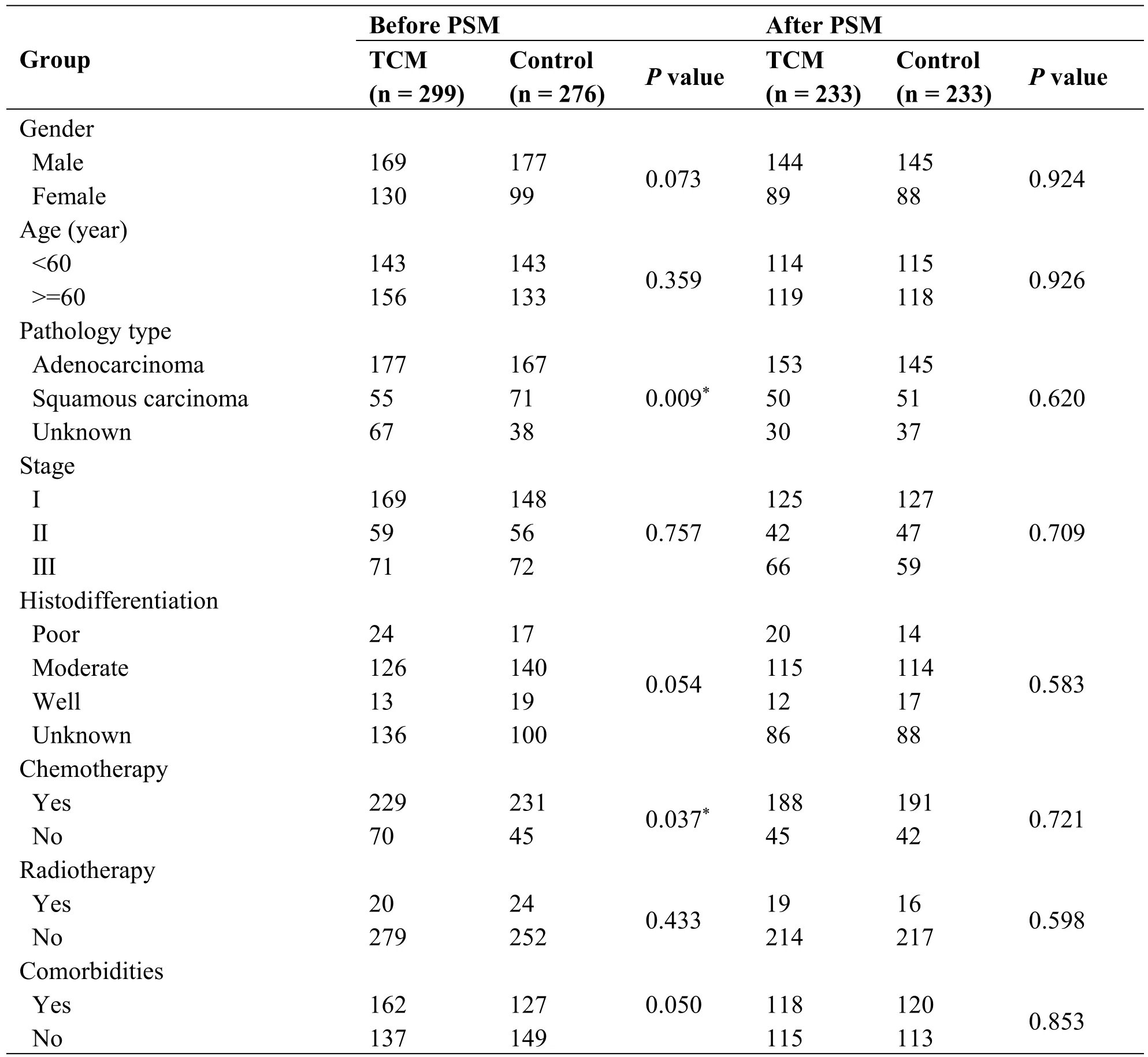
Table 1 The baseline characteristics and clinical features in the TCM group and control group.
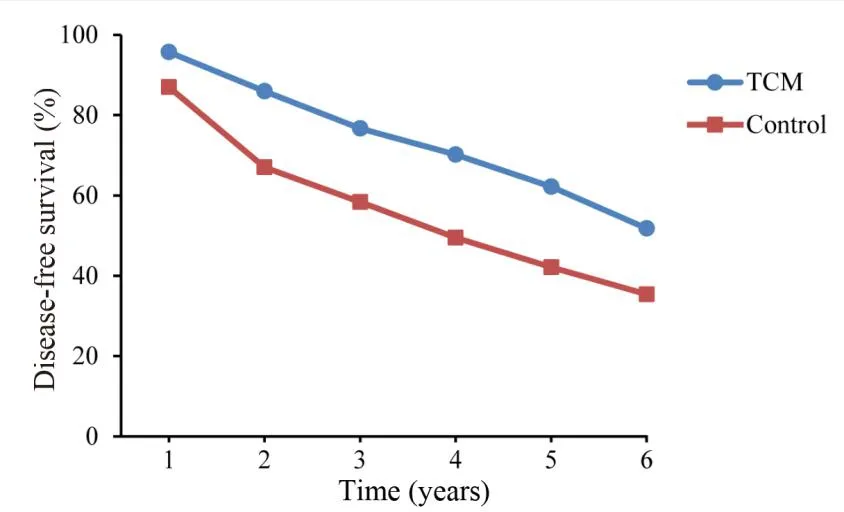
Figure 2 1-6 year disease-free survival in the TCM and control group
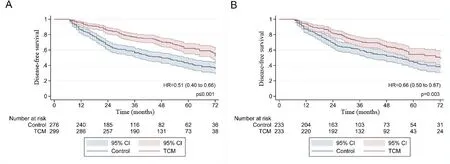
Figure 3 Disease-free survival curves for all patients before(A)and after(B)propensity scoring
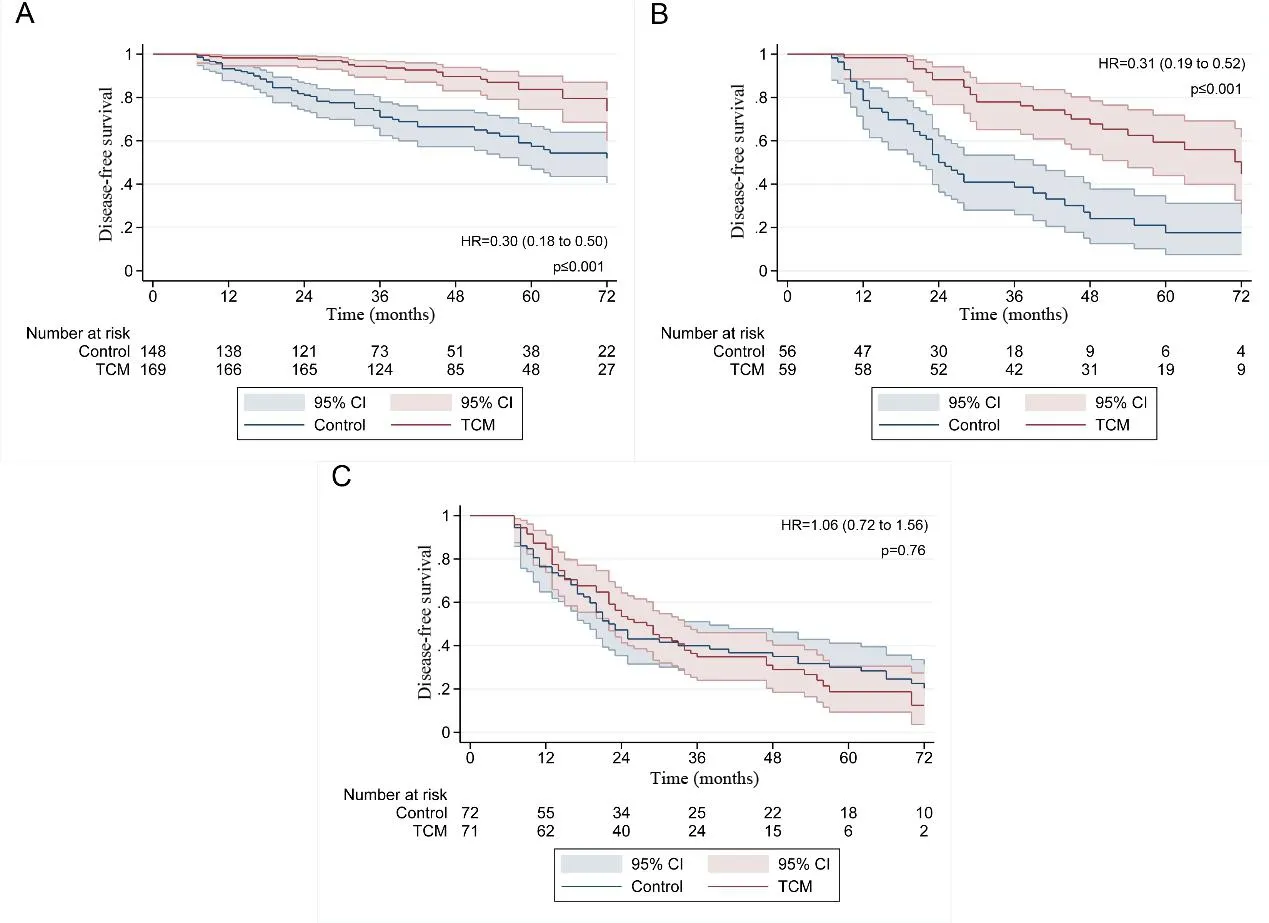
Figure 4 Disease-free survival curves for patients with stage I(A),II(B)and III(C)disease
Our study not only further explored the impact of long-term TCM treatment on survival of lung cancer patients,but also provided evidence for the role of long-term treatment TCM in patients with different stages lung cancer,and the results showed that TCM is independently associated with significantly improved DFS of postoperative stag e I-III lung cancer patients,especially in patients with stage I and II disease.
Before PSM,the baseline characteristics of TCM and control groups were not comparable,so we adopted PSM to reduce the imbalance between two groups of data by imitating randomization,making an unbiased estimating of TCM.In terms of DFS,our results in this study proved the significant effect of TCM treatment on lung cancer patients.We consider that may be the efficacy of TCM through body enhancing,toxicity reducing and improving the quality of life.At the same time,we found that from the third year,DFSs of lung cancer patients with stage III disease in the control group were higher than that stage III patients in TCM group and stage II patients in the control group,this may be related to the small sample size and may be associated with more lung cancer patients receiving chemotherapy and radiotherapy in stage III disease,this may result in some stage III patients living longer than some patients in stage II,and this requires further study.
Several limitations were existed in our study.First,as a retrospective study,the lack of randomization and the inherent disadvantages of this type of study resulted in a reduction in the credibility.Second,although we did propensity score match for baseline characteristics to be comparable on terms of gender,age,pathologic type,TNM stage,histodifferentiation,radiotherapy, chemotherapy and comorbidities,relatively accurate assessment of the efficacy was achieved.However,some confounding factors that not be considered made this study potentially biased,such as personal smoking history,family medical history and therapeutic history other than TCM treatment.If one individual has a history of smoking or a family history of lung cancer,he may have delayed the timely and effective treatment due to delayed diagnosis,so a poor survival will exist.In addition,if one patient did chemotherapy,radiotherapy or targeted drug therapy before receiving TCM treatment,his survival could be prolonged,otherwise the effect would be reversed.Third,due to the natural characteristics of TCM,it was complex in dialecticalanalysisand selection of prescription drugs,different patients’syndromes were treated differently at each visit.We did not classify the syndromes and medication,so we couldn’t identify what prescriptions and components were truly helpful.Finally,our sample size is not large enough and the majority of the population involved are come from Shanghai,China.There is currently no sufficient evidence that long-term TCM treatment is effective for alllung cancerpatientsin allregionsand all ethnicities.
Conclusion
This retrospective cohort study showed that long-term TCM treatment can improve the DFS of postoperative lung cancer patients,especially in patients with stage I and II disease.However,these observational findings need being validated by large sample RCTs.
1. Gadgeel SM,Ramalingam SS,Kalemkerian GP.Treatment of lung cancer.Radiol Clin North Am 2012,50:961-974.
2. Torre LA,Bray F,Siegel RL,et al.Global cancer statistics,2012.CA Cancer J Clin 2015,65:87-108.
3. Chen W,Zheng R,Baade PD,et al.Cancer statistics in China,2015.CA Cancer J Clin 2016,66:115-132.
4. Ferrara R,Mezquita L,Besse B.Progress in the management of advanced thoracic malignancies in 2017.J Thorac Oncol 2018,13:301-322.
5. Wakelee H,Kelly K,Edelman MJ.50 years of progress in the systemic therapy of non-small cell lung cancer.Am Soc Clin Oncol Educ Book 2014,34:177-189.
6. Eadens MJ,Robinson SI,Price KA.Effectiveness of maintenance treatments for nonsmall cell lung cancer.Lung Cancer(Auckl)2011,2:29-39.
7. Salgia R.Diagnostic challenges in non-small-cell lung cancer:an integrated medicine approach.Future Oncol 2015,11:489-500.
8. Liu J,Lin HS,Hou W,et al.Comprehensive treatment with Chinese medicine in patients with advanced non-small cell lung cancer: A multicenter,prospective,cohort study.Chin J Integr Med 2017,23:733-739.
9. Ling CQ,Wang LN,Wang Y,et al.The roles of traditional Chinese medicine in gene therapy.J Integr Med 2014,12:67-75.
10.Ling CQ,Yue XQ,Ling C.Three advantages of using traditional Chinese medicine to prevent and treat tumor.J Integr Med 2014,12:331-335.
11.Xu L,Li H,Xu Z,et al.Multi-center randomized double-blind controlled clinical study of chemotherapy combined with or without traditional Chinese medicine on quality of life of postoperative non-small cell lung cancer patients.BMC ComplementAltern Med 2012,12:112.
12.Zhao Z,Liao H,Ju Y.Effect of compound Kushen injection on T-cell subgroups and natural killer cells in patients with locally advanced non-small-cell lung cancer treated with concomitant radiochemotherapy.J Tradit Chin Med 2016,36:14-18.
13.Tang WR,Yang SH,Yu CT,et al.Long-Term effectiveness of combined treatment with traditional Chinese medicine and western medicine on the prognosis of patients with lung cancer.J Altern Complement Med 2016,22:212-222.
14.Liu JM,Lin PH,Hsu RJ,et al.Complementary traditional Chinese medicine therapy improves survival in patients with metastatic prostate cancer.Medicine 2016,95:e4475.
15.Huang Y,Cai T,Xia X,et al.Research advances in the intervention of inflammation and cancer by active ingredients of traditional Chinese medicine.J Pharm Pharm Sci 2016,19:114-126.
16.Xu Y,Mao JJ,Sun L,et al.Association between use ofTraditionalChineseMedicineherbal therapy and survival outcomes in patients with stage II and III colorectal cancer:a multicenter prospective cohort study.J Natl Cancer Inst Monogr 2017,2017:19-25.
17.Xu Y,Zhao AG,Li ZY,et al.Survival benefit of traditional Chinese herbal medicine(a herbal formula for invigorating spleen)for patients with advanced gastric cancer.Integr Cancer Ther 2013,12:414-422.
18.Jiang Y,Liu LS,Shen LP,et al.Traditional Chinese medicine treatmentasmaintenance therapy in advanced non-small-cell lung cancer:a randomized controlled trial.Complement Ther Med 2016,24:55-62.
19.Wang XQ,Liu J,Lin HS,et al.A multicenter randomized controlled open-label trial to assess the efficacy of compound kushen injection in combination with single-agent chemotherapy in treatmentofelderly patientswith advanced non-small cell lung cancer:study protocol for a randomized controlled trial.Trials 2016,17:124.
20.Chan KK,Yao TJ,Jones B,et al.The use of Chinese herbal medicine to improve quality of life in women undergoing chemotherapy for ovarian cancer:a double-blind placebo-controlled randomized trial with immunological monitoring.Ann Oncol 2011,22:2241-2249.
21.Liao YH,Lin CC,Lai HC,et al.Adjunctive traditional Chinese medicine therapy improves survival of liver cancer patients.Liver Int 2015,35:2595-2602.
22.Fei B,Dai W,Zhao S.Efficacy,safety,and cost of therapy of the traditional Chinese medicine,catalpol,in patients following surgical resection for locally advanced colon cancer.Med Sci Monit 2018,24:3184-3192.
23.Ezeome ER,Anarado AN.Use of complementary and alternative medicine by cancer patients at the University of Nigeria Teaching Hospital,Enugu,Nigeria.BMC Complement Altern Med 2007,7:28.
24.Hyodo I,Amano N,Eguchi K,et al.Nationwide survey on complementary and alternative medicine in cancer patients in Japan.J Clin Oncol 2005,23:2645-2654.
25.Chen YZ,Feng XB,Li ZD,et al.Clinical study on long-term overallsurvivalof advanced non-small-cell lung cancer patients treated with Chinese medicine and Western medicine.Chin J Integr Med 2014,20:179-183.
26.Li SG,Chen HY,Ou-Yang CS,et al.The efficacy of Chinese herbal medicine as an adjunctive therapy for advanced non-small cell lung cancer:a systematic review and meta-analysis.PLoS One 2013,8:e57604.
27.Xu ZY,Jin CJ,Zhou CC,et al.Treatment of advanced non-small-cell lung cancer with Chinese herbal medicine by stages combined with chemotherapy.J Cancer Res Clin Oncol 2011,137:1117-1122.
28.Liao YH,Li CI,Lin CC,et al.Traditional Chinese medicine as adjunctive therapy improves the long-term survival of lung cancer patients.J Cancer Res Clin Oncol 2017,143:2425-2435.
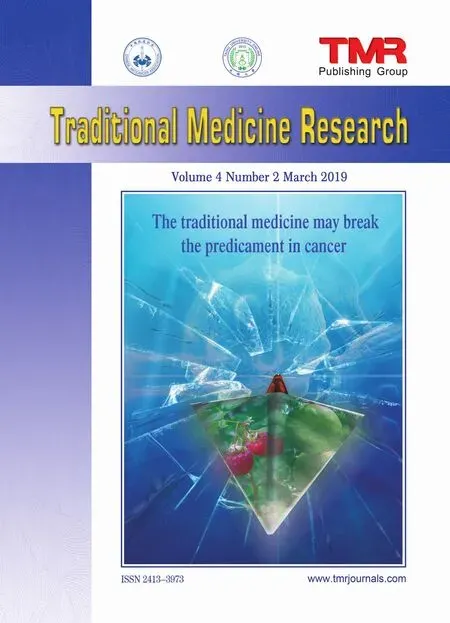 Traditional Medicine Research2019年2期
Traditional Medicine Research2019年2期
- Traditional Medicine Research的其它文章
- Complementary and alternative medicine for cancer treatment:magic or fraud?
- Annual advances of integrative pharmacology in 2018
- Advances in research on the anticancer mechanism of the natural compound cucurbitacin from Cucurbitaceae plants:a review
- What are the challenges facing cancer therapy base on the dissipative structure theory
- Totalsaponinsin RubusparvifoliusL.inducelymphomacells apoptosis through upregulated Bax/Fas and downregulated Bcl-2 in vivo and in vitro
